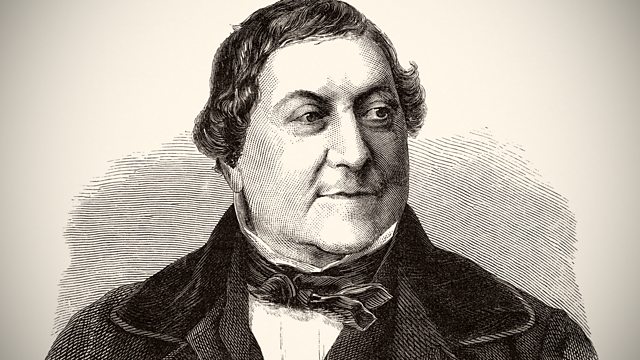
An Italian in Paris
Donald Macleod presents five takes on the life and music of Gioachino Rossini. Today, the composer’s on-off relationship with the city of Paris.
This week, Donald Macleod presents five takes on the life and music of Gioachino Rossini. Today, the composer’s on-off relationship with the city of Paris.
Rumours that Rossini was planning to leave Italy for Paris started doing the rounds in 1818, after his comic opera L’Italiana in Algeri created a sensation at the Théâtre Italien there; but it wasn’t until the end of 1824 that he finally signed on the dotted line and relocated to the French capital. Rossini’s contract with the French government required him to write operas for both the Théâtre Italien and the Opéra, which had been struggling commercially. His two major contributions to the Opéra were Count Ory and William Tell, comic and ‘serious’ operas respectively: the former, a glorious musical salvage operation from an operatic entertainment originally devised for the coronation of Charles X, Il viaggio a Reims; the latter, a sprawling six-hour epic that set the template for French Grand Opera and perhaps, down the line, the music dramas of Wagner. In 1836, Rossini left Paris for Bologna, where he spent nearly 20 years in a downward spiral of ill-health and depression whose root cause was the venereal disease he had in all probability contracted in his 20s. In 1855, he and his former mistress, now wife and carer, Olympe Pélissier, returned to Paris, so that Rossini could benefit from the attentions of an expert urologist. The Rossinis settled in Passy, where they established weekly musical gatherings – Samedi soirs – and Rossini started to compose again. His Péchés de vieillesse – Sins of Old Age – run to 14 volumes; a Rossinian byway well worth exploring.
Il viaggio à Reims; Scene 20, ‘Signor, ecco una lettera’
Katia Ricciarelli (Madame Cortese)
Lucia Valentini Terrani (Marchesa Melibea)
Lella Cuberli (Contessa di Folleville)
Cecilia Gasdia (Corinna)
Francisco Araiza (Conte di Libenskof)
Samuel Ramey (Lord Sidney)
Ruggero Raimondi (Don Profondo)
Chamber Orchestra of Europe
Claudio Abbado, conductor
Le Comte Ory; Act 2 No 11, ‘A la faveur de cette nuit obscure’
John Aler, tenor (Count Ory)
Diana Montague, mezzo soprano (Isolier)
Sumi Jo, soprano (Countess Adèle)
Lyon Opera Chorus & Orchestra
John Eliot Gardiner, conductor
William Tell; Act 3 Scene 3, ‘Sois immobile’
Gabriel Bacquier, baritone (William Tell)
Royal Philharmonic Orchestra
Lamberto Gardelli, conductor
Soirées musicales; 2. Il rimprovero; 3. La partenza
Stella Doufexis, mezzo soprano
Bruce Ford, tenor
Roger Vignoles, piano
Stabat Mater (1842 version); 2. Cujus animam gementem; 3. Quis est homo
Anna Netrebko, soprano
Joyce DiDonato, mezzo soprano
Lawrence Brownlee, tenor
Orchestra of the Accademia Nazionale di Santa Cecilia
Antonio Pappano, conductor
Assez de memento: dansons (Péchés de vieillesse, vol 6)
Frederic Chiu, piano
Mi lagnerò tacendo in D (Musique anodine)
Cecilia Bartoli mezzo soprano
Charles Spencer, piano
Produced by Chris Barstow for ����ý Wales
Last on
More episodes
Next
You are at the last episode
Music Played
-
![]()
Gioachino Rossini
Il viaggio a Reims, ossia L'Albergo del Giglio d'oro (extract)
Singer: Katia Ricciarelli. Singer: Lucia Valentini Terrani. Singer: Lella Cuberli. Singer: Cecilia Gasdia. Singer: Francisco Araiza. Singer: Samuel Ramey. Singer: Ruggero Raimondi. Orchestra: Chamber Orchestra of Europe. Conductor: Claudio Abbado.- DG 477 7435.
- Deutsche Grammophon.
- 7.
-
![]()
Gioachino Rossini
Le Comte Ory: Act 2, No 11
Singer: John Aler. Singer: Diana Montague. Singer: Sumi Jo. Choir: Lyon Opera Chorus. Orchestra: Lyon Opera Orchestra. Conductor: Sir John Eliot Gardiner.- DG 422 406-2.
- Deutsche Grammophon.
- 10.
-
![]()
Gioachino Rossini
William Tell: Act 3, Scene 3
Singer: Gabriel Bacquier. Orchestra: Royal Philharmonic Orchestra. Conductor: Lamberto Gardelli.- WARNER 6407632.
- WARNER.
- 16.
-
![]()
Gioachino Rossini
Les Soirees Musicales (Nos 2 and 3)
Performer: Roger Vignoles. Singer: Stella Doufexis. Singer: Bruce Ford.- Hyperion: CDA67647.
- Hyperion.
- 2.
-
![]()
Gioachino Rossini
Stabat Mater: Cujus animam gementem; Quis es homo
Singer: Anna Netrebko. Singer: Joyce DiDonato. Singer: Lawrence Brownlee. Orchestra: Accademia Nazionale Di Santa Cecilia Rome Orchestra. Conductor: Sir Antonio Pappano.- WARNER 6 40529 2.
- WARNER.
- 2.
-
![]()
Gioachino Rossini
Assez de memento
Performer: Frederic Chiu.- HARMONIA MUNDI HMU 907102.
- HARMONIA MUNDI.
- 4.
-
![]()
Gioachino Rossini
Aragonese
Performer: Charles Spencer. Singer: Cecilia Bartoli.
Broadcasts
- Fri 16 Nov 2018 12:00����ý Radio 3
- Fri 17 Apr 2020 12:00����ý Radio 3
Beethoven Unleashed – the box set
What was really wrong with Beethoven?
Composers A to Z
Who knew? Five eye-opening stories from Composer of the Week
Five reasons why we love Parry's Jerusalem
What is the strange power of Jerusalem which makes strong men weep?
A man out of time – why Parry's music and ideas were at odds with his image...
The composer of Jerusalem was very far from the conservative figure his image suggests.
Composer Help Page
Find resources and contacts for composers from within the classical music industry.





